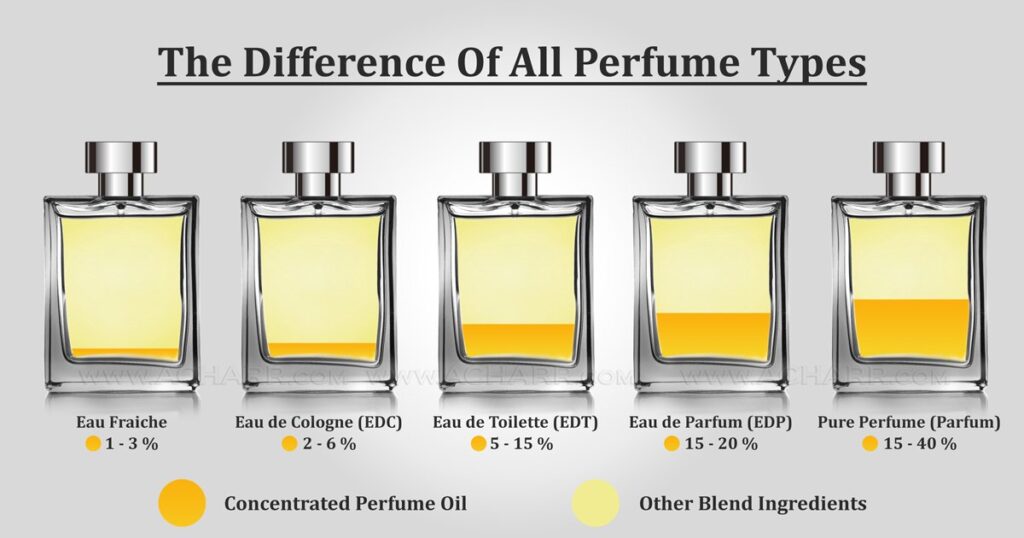Blog
The Difference Between Eau de Parfum, Eau de Toilette, and Cologne
The Difference Between Eau de Parfum, Eau de Toilette, and Cologne
When it comes to perfumes, one of the most common points of confusion is understanding the difference between Eau de Parfum (EDP), Eau de Toilette (EDT), and Cologne (EDC). These terms are often used interchangeably, but they actually refer to different types of fragrances that vary in their concentration, scent longevity, and ideal usage. Understanding these differences can help you make an informed decision when purchasing a fragrance, ensuring that you select the right scent for your preferences and needs. In this article, we’ll break down the distinctions between Eau de Parfum, Eau de Toilette, and Cologne, and guide you in choosing the perfect fragrance for any occasion.
What Is Eau de Parfum (EDP)?
Eau de Parfum is one of the most popular and long-lasting fragrance types, favored for its rich scent and full-bodied composition. Eau de Parfum generally contains a higher concentration of fragrance oils than Eau de Toilette and Cologne, making it one of the more intense and long-lasting options.
Fragrance Concentration
Eau de Parfum typically contains between 15% to 20% fragrance oils. This higher concentration allows the scent to last longer, often up to 4 to 8 hours depending on your skin type, environment, and activity levels.
Longevity
Due to its higher concentration of fragrance oils, Eau de Parfum offers longer-lasting wear. It stays on the skin for several hours, making it ideal for those who want a fragrance that doesn’t fade quickly throughout the day. This makes EDP a great option for formal events, night-outs, or long workdays when you need a fragrance that can endure.
Scent Profile
Eau de Parfums often have a complex and layered scent profile, with multiple notes that evolve throughout the day. The top notes give you the first impression, while the heart and base notes unfold as the scent develops. This gradual release of fragrance adds depth and sophistication to the overall experience.
When to Wear Eau de Parfum
Eau de Parfum is perfect for evening wear, special occasions, or colder months when you want a fragrance that has more depth and presence. Its long-lasting nature also makes it an excellent option for all-day wear, such as during business meetings or important events.
What Is Eau de Toilette (EDT)?
Eau de Toilette is a lighter and more subtle fragrance than Eau de Parfum, typically favored for daily use or warmer weather. It contains a lower concentration of fragrance oils, making it a more refreshing and less intense option.
Fragrance Concentration
Eau de Toilette contains between 5% to 15% fragrance oils, which is less than Eau de Parfum. This makes it lighter and less concentrated, offering a more subtle scent experience. The lower fragrance oil content means that the scent is not as intense or long-lasting as EDP.
Longevity
Due to its lighter concentration, Eau de Toilette generally lasts between 3 to 5 hours on the skin. This makes it ideal for daily wear when you prefer a more subtle, refreshing fragrance. However, you might need to reapply it during the day to maintain the scent.
Scent Profile
Eau de Toilette fragrances tend to have a lighter, fresher scent profile, making them ideal for those who want something less overpowering. The fragrance is often composed of citrus or herbaceous notes, with a focus on brightness and freshness.
When to Wear Eau de Toilette
Eau de Toilette is perfect for daytime wear and warmer weather, such as spring or summer. It’s also great for casual occasions or everyday activities where you want a fragrance that’s light and uplifting but not too strong. It’s also a good choice for those who prefer a fragrance that’s not as noticeable or overpowering.
 What Is Cologne (EDC)?
What Is Cologne (EDC)?
Cologne, or Eau de Cologne, is typically the most diluted form of fragrance among the three. It’s often used interchangeably with “cologne” for men, but it’s important to note that the term “cologne” is more about the product’s concentration than its gender association. Eau de Cologne contains the lowest concentration of fragrance oils, making it the lightest and most refreshing option.
Fragrance Concentration
Eau de Cologne contains only about 2% to 5% fragrance oils, which makes it the most diluted form of fragrance. This means that the scent is much lighter and less concentrated, providing a brief and refreshing experience rather than a long-lasting one.
Longevity
Due to its low concentration, Eau de Cologne typically lasts between 2 to 4 hours on the skin. This shorter longevity makes it ideal for a quick pick-me-up or a fresh burst of fragrance, but it may require frequent reapplications throughout the day.
Scent Profile
Eau de Cologne fragrances are generally light, fresh, and citrusy. They often include top notes of citrus fruits like lemon, orange, or bergamot, which create a vibrant, energizing scent. The fragrance is refreshing and perfect for when you want a subtle, invigorating aroma without it lingering too long.
When to Wear Cologne
Cologne is best suited for hot weather, morning wear, or situations when you want a quick, refreshing burst of fragrance. It’s also a great choice for those who prefer a fragrance that’s not overpowering or long-lasting. Cologne is commonly used during casual activities or sports, where a light and refreshing scent is all you need.
 Which One Should You Choose?
Which One Should You Choose?
The decision between Eau de Parfum, Eau de Toilette, and Cologne ultimately comes down to personal preference and lifestyle needs. If you prefer a long-lasting fragrance with depth and sophistication, Eau de Parfum is the way to go. For a lighter, more subtle scent that’s perfect for daily wear or warmer weather, Eau de Toilette is a great choice. If you’re looking for a quick, refreshing burst of fragrance that you can reapply throughout the day, then Cologne might be your best option.
Additionally, consider the occasion and season. Eau de Parfum is ideal for formal events or evening wear, while Eau de Toilette suits casual or daytime activities. Cologne is perfect for an uplifting morning or during hot summer days when you need a light, energizing fragrance.
Ultimately, there’s no right or wrong choice—experiment with different fragrance concentrations and find what works best for you. Whether you gravitate toward the richness of Eau de Parfum or the freshness of Eau de Cologne, the right fragrance can make you feel confident, refreshed, and ready to take on the day.


